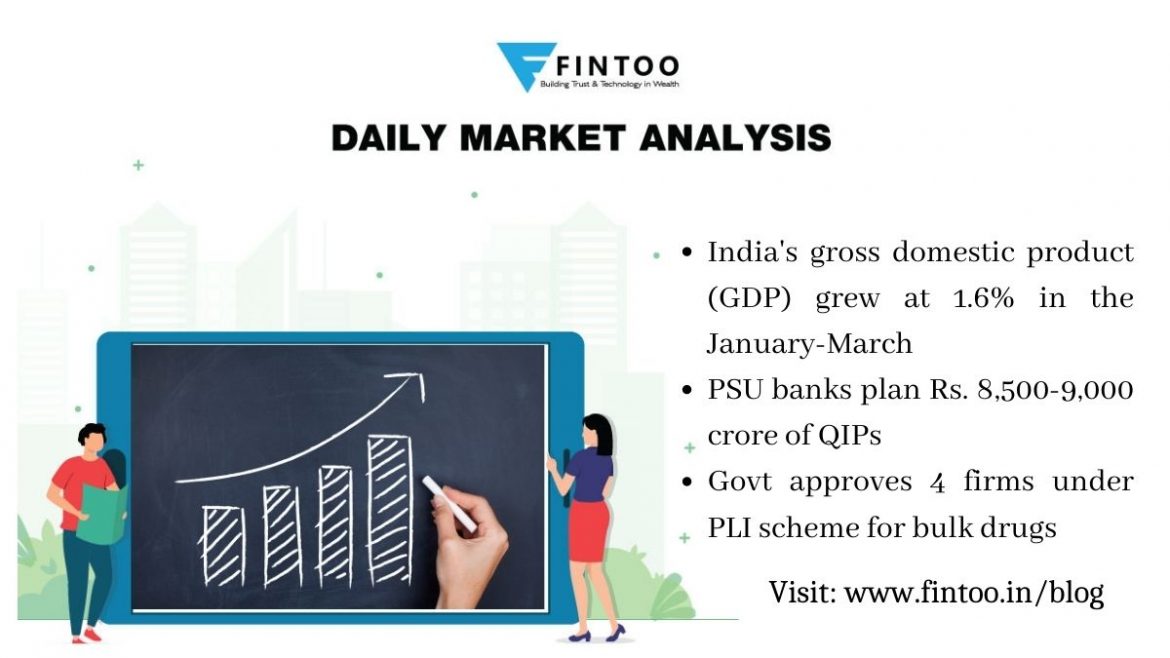

India’s GDP grows 1.6% in fourth quarter, contracts 7.3% in FY 20-21
Amid the coronavirus pandemic, India’s gross domestic product (GDP) grew at 1.6% in the January-March quarter of fiscal year 2020-21, but witnessed a contraction of 7.3 per cent for the entire fiscal year.
This is the first full-year contraction in the Indian economy in the last four decades since 1979-80, when GDP had shrunk by 5.2%. This is also the second straight quarter of expansion since India exited a rare recession.
India’s GDP figures showed the growth at 3% in Q4 of FY20, while growth for FY20 came at 4%, an 11-year low.
Sector wise Q4 FY20 GVA Growth Analysis:
- “Manufacturing sector”- accelerated to 6.9% in Q4 FY20 compared to a contraction 4.2% a year ago.
- “Farm Sector”- down at 3.1%, compared to 6.8% a year ago.
- “Construction Sector”- grew by 14.5% from 0.7% a year ago.
- “Mining Sector”- shrank by 5.7 per cent, as against a contraction of 0.9% a year ago.
- “Electricity, gas, water supply and other utility services Sector”- grew by 9.1%, against 2.6% expansion a year ago.
- “Trade, hotel, transport, communication and broadcasting services Sector”- contracted by 2.3% from 5.7% growth earlier.
- “Financial, Real estate and Professional services Sector”- grew by 5.4% from 4.9% growth a year ago.
- “Public administration, defence and other services Sector”- growth fell to 2.3% from 9.6% a year earlier.
RBI Governor-led Shaktikanta Das Monetary Policy Committee, in its first bi-monthly monetary policy review for FY21, retained its GDP growth projection at 10.5% for FY21.
The economy, which was facing a slowdown even before the pandemic, now confronts a crash of consumer demand – constituting over 55% of the economy – as household incomes and jobs have declined. Unemployment soared to a near one-year high of 14.73% in the week ending May 23, according to the Centre for Monitoring Indian Economy, a Mumbai-based private think tank
Finance Minister Nirmala Sitharaman, who said on Friday that “no decision has been taken for another stimulus package”, has limited space due to a fall in tax collections and rising public debt.
11 year low growth in GDP, one-year high unemployment of 14.73%, no signs of stimulus package from government due to falling tax collections & rising public debt, seems to worsen the situation going forward for next year. Though GDP growth in Q4 has given hopes & experts are still positive while making optimistic Growth projections for the upcoming year.
Government approves four firms under PLI scheme for bulk drugs
The government has given approval to four waitlisted firms under the Production Linked Incentive (PLI) scheme for domestic manufacturing of bulk drugs.
The companies which have been given approval are — Solara Active Pharma Science Ltd, Rajasthan Antibiotics Ltd, Dhatri Lab Pvt Ltd and Vital Laboratories Pvt Ltd.
It envisages setting up greenfield plants in four different target segments with a total outlay of Rs 6,940 crore for the period 2020-21 to 2029-30.
The “PLI scheme” was launched by Department of Pharmaceuticals for promotion of domestic manufacturing of critical bulk drugs- KSMs/APIs. With this, a total of 46 applications with committed investment of Rs 5,355.44 crore and expected employment generation of about 11,210 have been approved by the government so far under the PLI Scheme for Bulk Drugs. Setting up of these plants will make the country self-reliant to a large extent in respect of these bulk drugs
“Solar active Pharma science Ltd.” is the only listed company out of the 4 approved companies. Due to the approval by the government under PLI scheme for domestic manufacturing, we can expect the positive growth in share prices of Solar active Pharma science Ltd in the longer term.
PSU banks plan Rs. 8,500-9,000 crore of QIPs
Public sector banks are expected to launch qualified institutional placement (QIP) offerings worth ₹8,500-9,000 crore in the next quarter amid a rebound in equity markets, according to sources in the know.
“Indian Bank”, “Bank of Maharashtra”, and “Canara Bank” expected to launch their offerings between July and September.
These QIP offerings are going to boost the PSU Banking sector. Such offering is also expected to provide cushion for further declines in the performance of the PSU banks. The launch of Rs 8,500-9,000 crore of QIPs can be considered as the relieving news for the investors. And the stocks of Indian Bank, Bank of Maharashtra, and Canara Bank should be kept on watchlist as with the execution of expected launch of offering between July & September has fair amount of chance to increase market shares.
Auto companies prepare financial packages to help dealerships
Several of India’s leading automakers are working on or rolling out incentive packages to support their dealers who have been hit hard by lockdowns in states to check the spread of the Covid-19 pandemic.
These incentives being planned or offered by “Maruti Suzuki”, “Tata Motors”, “Renault India”, “Toyota Kirloskar Motor”, “Daimler India Commercial Vehicles” and “Honda Motorcycle” & “Scooter India” include financial support to offset interest cost on inventory during the lockdown, extension in credit periods, insurance cover, salary support and vaccination expenses.
Companies are also working at quick resolution of claims to facilitate cash flow at dealerships, as retail outlets gradually open up with several state governments expected to ease restrictions over the next few weeks, as the number of Covid-19 cases falls.
These incentives are expected to help the dealers, who were badly affected by the pandemic, to improve their operation and sales & in-turn these are expected to help the auto companies to achieve growth in the net revenues.
Banks begin process of restructuring of loans up to Rs 25 cr
To provide support to small businesses hit by the second coronavirus wave, banks have initiated the process of restructuring pf loans up to Rs 25 Crore in line with the Covid-19 relief measures announced by the RBI earlier this month. Many lending institutions have got board approval for the resolution framework and eligible borrowers are being contacted For example, “Bank of India” has already sent messages to its eligible customers, meanwhile “Punjab & Sind Bank’s” debt recast plan has been approved by the board.
With this the Banking Sector can be expected to perform good at least for THEnext Quarter, though chances can’t be neglected to see the sector again in trouble 2-3 Quarters down the line.
Also read: Daily Market Analysis – 6th May 2021 (Global Economy) – Fintoo Blog
Has RBI really endorsed crypto transactions in India?
Hours after major Indian banks, including State Bank of India (SBI) and HDFC Bank sent emails to customers warning against using their services to trade in crypto currencies, the Reserve Bank of India (RBI) has clarified that banks cannot cite the 2018 circular for such communications. This is because the circular was quashed by the Supreme Court of India on a petition filed by Internet and Mobile Association of India in March, 2020.
Clearly, the clarification doesn’t mean that the RBI is endorsing crypto trading. The regulator, in fact, has not taken any position on the validity and legality of cryptocurrency transactions in India. It has only avoided a potential legal hazard—inviting contempt of the apex court by maintaining silence when a clutch of banks has used its old, invalid circular to keep the crypto lobby away. The RBI has only asked banks not to shoot from its shoulder. The language indicates high caution. Banks will not have the backing of the regulator and will have to deal in crypto at their own risk.
Pepperfry expects to join unicorn club soon, to launch IPO after booking profit
Online furniture company Pepperfry would be in the unicorn club – companies with a valuation of more than USD 1 billion – by the time its initial public offer hits the market,
The company has raised USD 235 million till date from Norwest Venture Partners, Goldman Sachs, Bertelsmann Investments India (BII).
Pepperfry announced plans to add 200 offline studios on FOFO (franchise owned franchise operated) across tier 2 and tier 3 towns. Studios contribute 30 per cent in the overall business. With new studios coming up, their contribution in business should be going to upwards of 40 per cent. The stores will come up with at least 100 new cities. The company has already opened over 70 studios across 40 cities in the last six years out of which 32 are based on the FOFO model.
Currently the online business model contribute to 70% in overall business, which is the main reason that amid the coronavirus pandemic, the company’s business is still in good position and it is further expected to grow once planned addition of 200 offline studios on FOFO model starts contributing to the overall business.
Work From Home (WFH) leads to surge in demand for office furniture rentals: Industry experts
Corporates and independent consumers are renting ergonomic curated products to make working from home more efficient, especially in metro cities, resulting in surge in furniture rentals, according to industry players.
Many companies have also tied up with “Fabrento” for providing a comfortable office set up to their employees, as told by Fabrento founder Sidhant Lamba.
“City Furnish” company has witnessed 40 per cent increase in demand for WFH solutions like study tables and chairs, announced by founder and CEO Neerav Jain.
In the Furniture Sector, such online rental marketplaces like Fabrento & City Furnish are expected to see high consumer demand and good profit-making opportunities for the next 6 months till WFH continues.
To Invest and keep regular track of your portfolio download: Fintoo App Android http://bit.ly/2TPeIgX / Fintoo App iOS http://apple.co/2Nt75LP
Related Posts
Stay up-to-date with the latest information.


